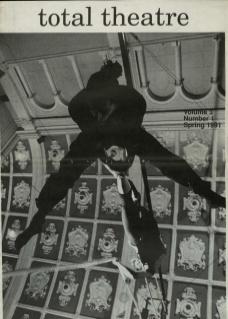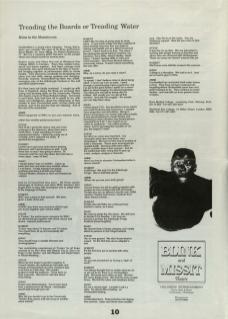Unclassified is a young mime company. Young, that is, when you consider the ages of its three performers: Steve Medlin, 20. Isaac Ngugi, 20, Robert Stephenson, 21. But it is a company which has been on the London street and cabaret scene for several years.
Robert, Isaac and Steve first met at Weekend Arts College (WAC) in Camden. There they studied mime, dance and drama together. And there, perhaps most importantly, they were introduced to the idea of fusion – the bringing together of performance skills to create theatre. They seemed to constantly be developing new ideas and new skills, always growing and changing. Recently, however, Unclassified has been less visible, emerging only at the Edinburgh Festival or the odd specialist cabaret event.
But they have not totally vanished. I caught up with them in Deptford, where the three are pursuing their acting and devising skills on the Community Theatre Arts degree course of Rose Bruford College. Immersed in hard work, they took time off to speak to me, with clarity and intelligence, about the relationship of their studies to their Unclassified work; of their plans and projects and of the process they are following; and of the role of the mime/actor.
ANNE
What happened at WAC to turn you towards mime, rather than another performance form?
STEVE
First of all, I joined the drama club and I had a big gap in the afternoon, when there was a mime class. It was something I'd never experienced before. I joined up purely out of curiosity, and it captured me really. It sparked the imagination.
ROBERT
I joined up to get some more drama training, Someone said I should dance as well. I said there was no way I was going to dance. So someone said the next step down from that was a mime class. I was sixteen then.
ISAAC
I started when I was twelve at WAC. I gave up ballet first term and took mime instead, where I met Steve. I really enjoyed not saying anything and doing it all with your body. Graham Walters worked us hard and insisted we explore.
And so Unclassified was born. All three spoke admiringly of Graham and other WAC teachers who taught them to play with techniques and to adapt them to the language of theatre.
ROBERT
WAC was a place to find yourself. We were given a taste of the arts.
ANNE
At WAC was there any conscious effort to get you to join together your various skills?
STEVE
In Fusion, the performance company for WAC, we did workshops together with mime, dance and drama – towards performance.
ROBERT
Fusion was about ten dancers and ten actors. You mixed them all up and everybody did everything
ISAAC
They would bring in outside directors and choreographers.
Two outstanding experiences at Fusion for all three seemed to be their work with Beyher Fox in Don't Go Down to the Station and with Beyher and David Glass in Blood Wedding.
STEVE
When we first began to perform together in Covent Garden, we realised we had skills and energy and had picked up tricks, but there was a lot more to it than that. We couldn't project or hold the audience. There were no slow moments. We had no real idea about storytelling
ISAAC
It was most disheartening. You'd come back from a performance all hoarse – and people would walk through your set.
ANNE
Why did you decide to go to the Community Theatre Arts course and not Lecoq or another mime school?
ROBERT
I didn't like the idea of going away to study mime. A very harsh image had been painted of mime training: how they tear you down to nothing and rebuild you as a silent movement person. I didn't want to do that. The mime I was getting was good training: Graham, lan Cameron, Zena Dilke, Adrian Hedley, David Glass. I knew I needed skills in voice and communication. Also Rose Bruford offered a community course. It wasn't about something that was elite.
ANNE
Why, as a mime, do you need a voice?
ROBERT
To speak! I don't believe mime is about being silent. I never say I am an actor. I went through a period saying I was a performer, but I've got to the point where I admit I'm a mime! Mime is about imagery: it's about imagination. The effect you can get by being silent is brilliant. But vocally you can get all that emotion. And with the imagery – the people, you can take them away.
ISAAC
I heard about CTA – this wonderful course where you could do drama and movement. I needed voice projection and articulation. Being in drama school gave me contact with other people. It was about learning to create theatre and becoming a more rounded, less limited person. I wanted to try it all. I see myself as an 'artist' or 'performer'. I've called myself a 'mime', but it's provoked the reaction of ‘oh yes, the striped T-shirt!’.
STEVE
For all of us, voice was important. Our characters were also very loose, very stereotyped. We had no idea how to analyse or build a character. These were techniques we needed badly. Devising skills were skills I didn't consider when I was younger. And all the intellectual skills: being able to pick up a text, analyse, analyse a character.
ANNE
Have you had to abandon Unclassified while in drama school?
ROBERT
It still lives! We took it to the Edinburgh Fringe. We've definitely grown.
ANNE
Where do you see your work going?
ISAAC
Around Easter we will be getting together with people we have worked well with previously. People who are on different strands now: ballet dancers, theatre technicians, students from other drama schools...
ROBERT
People who left WAC but continued their interest in mime, as it were.
ISAAC
We want to adapt the Ubu plays. We will have to decide if it is feasible. Last year we learned a lot from the Edinburgh Festival Fringe [Great laughter].
ISAAC
We learned how a fringe company can't really afford to perform in the Fringe Festival.
STEVE
Ubu is new ground. We don't know what to expect. It's the first time we've adapted a text.
ROBERT
It's the first time we've worked with other people.
ANNE
Do you see yourselves as having a 'style' of work?
ROBERT
I've always thought that no matter what we do or set out to do, there is an Unclassified style. We know each other so well. We find the same things funny. We find the same people funny. We find the same sad situations funny.
ISAAC
It's not a closed style. I wouldn't call it a style. It's almost like a feeling – an Unclassified feeling.
ANNE
Unclassified lives. Robert finishes his degree this summer. Isaac and Steve have another year. Ubu Roi is on the cards. You are looking to expand. How did you come to that decision?
STEVE
It was the Co-op idea. We are interested in working with people training at Rambert and others who are obsessed with Shakespeare. These are areas we haven't entered into yet.
ROBERT
We'll have more definite answers this summer.
ISAAC
College is a discipline. We had to do it. And we've had to give it 100%.
Unclassified has not buried itself under drama school. They have not been seduced into forgetting where Unclassified came from and what it wanted to do. They continue to create theatre – and now with an even greater fusion of styles.

